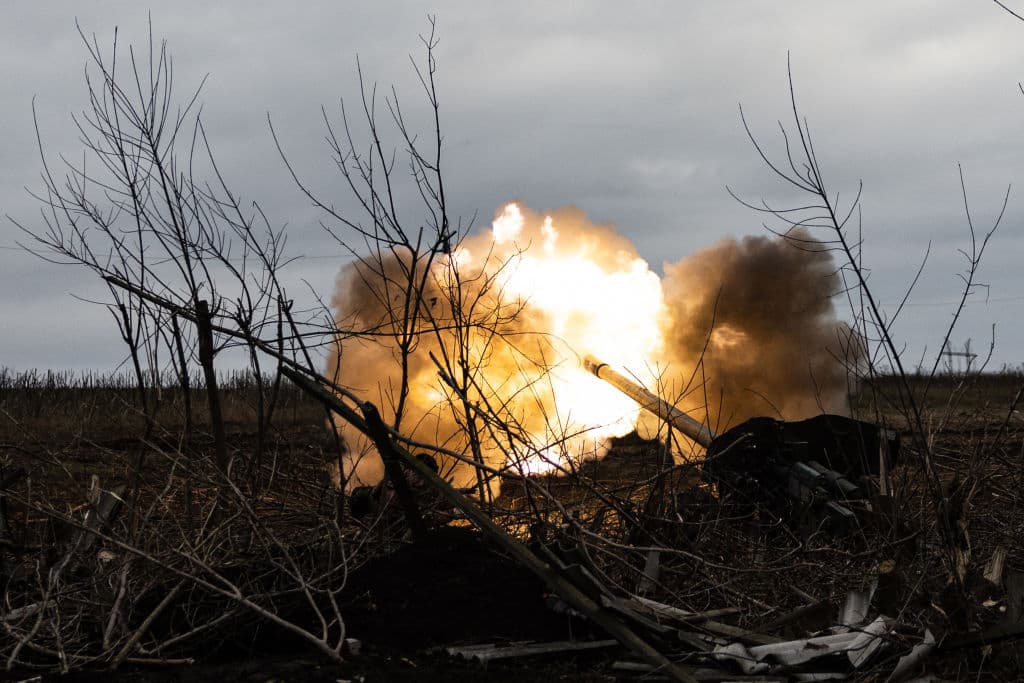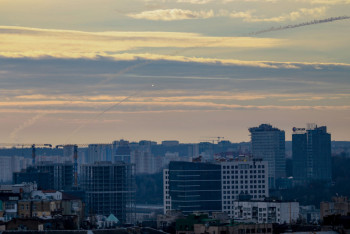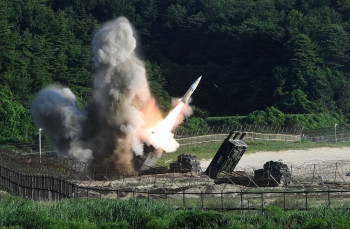Oleg Sukhov: What should be done to ensure Ukraine's victory in 2023

Editor’s note: The opinions expressed in our op-ed section are those of the authors and do not purport to reflect the views of the Kyiv Independent.
When Russia’s full-scale invasion of Ukraine began almost a year ago, the issue of Ukraine’s very existence and survival came to the forefront.
But now, after almost a year of successful resistance, victory over the aggressor is within the realm of the possible. Hopefully, it can happen this year.
Obviously, victory is not automatic or inevitable.
Russia has suffered setbacks and defeats but it is still a force to be reckoned with. The Russian economy, military, and political system have so far managed to withstand all the blows.
It means that both Ukraine and the West need to make a serious effort to win.
The West should abandon the policy of having its cake and eating it too – i.e. helping Ukraine sufficiently to prevent its collapse but not enough to ensure its victory.
To win the war, the West should stop dithering, procrastinating and – first and foremost – being afraid.
Victory over Russia implies a total, unequivocal commitment – just like the Allies’ commitment to defeat Adolf Hitler during World War II.
Decisive battle
First, a series of small victories and seizures of territory will not be enough.
To win the war, Ukraine needs to encircle a major group of Russian troops and defeat them in a decisive battle.
The liberation of Kherson in November was a major Ukrainian victory but it was not a crushing defeat for Russia: most Russian troops withdrew to the Dnipro River’s left bank of their own accord, and few troops and little equipment were destroyed.
Also by this author: Ukrainian kleptocrats use war to entrench corruption, with Western experts as facade (OPINION)
During the liberation of parts of Kharkiv Oblast in September, Russian forces were forced to withdraw, and some of the troops and equipment were destroyed. However, the scale of the defeat was short of a decisive victory.
The aim of any war is not to seize territory per se but to defeat the enemy.
If the enemy is allowed to withdraw, they will still be able to wage war and conduct offensives in the future. A good example is the Soviet Union, which had to withdraw all the way to Moscow and Leningrad in 1941 but eventually won the war in 1945.
Russia may still be able to wage war for years, and Ukraine’s victory is not inevitable.
Russia has suffered defeats but it is still able to win local and tactical victories, including what appears to be the recent capture of most of Soledar, Donetsk Oblast.
Russia has an advantage in manpower – its current population is about four times bigger than Ukraine's. As a result, it can mobilize millions of conscripts to boost its war effort.
Since human life costs nothing in Russia, the Kremlin will try to win by using human wave attacks. Hundreds of thousands of Russian soldiers will be killed for the sake of Russian dictator Vladimir Putin’s insane geopolitical gamble.
It is true that Russian conscripts’ motivation is worse than that of Ukrainian soldiers who defend their homeland. But the sheer number of Russian conscripts and the military experience that they’re getting do matter.
Russia also has a bigger quantity of weapons. In some categories of weapons, it still has a qualitative advantage as well, although a lot of Russian weapons are less advanced than their Western equivalents supplied to Ukraine.
Russia’s defense industry has lost much of its access to high technology but there are ways to bypass Western sanctions. Iran still manages to manufacture weapons with Western components despite having been under sanctions for decades.
Moreover, eventually Russia will likely seek to dramatically boost its arms production, which will allow it to produce a gigantic amount of low-quality weapons.
Unless NATO arms Ukraine sufficiently, this enormous amount of low-end junk may still be able to make a huge difference on the front line.
What the West should do
There is the opinion that the Western sanctions against Russia will help Ukraine to win a decisive victory.
This is an illusion.
It's true that the sanctions are creating economic problems in Russia, and they should be kept and strengthened.
But they have not led to an economic collapse or a cut in military spending in Russia. Economists say that no economic collapse will happen in the future either.
Moreover, living standards will fall in Russia but the authorities will not cut military spending. They will just redirect resources from the civilian sector to the defense industry.
The historic record is clear: Countries at war often increased military production, as opposed to cutting it, when they faced the most difficult economic conditions (including World War I and World War II).
There is only one way to enable Ukraine to defeat Russia in a decisive battle: to dramatically increase the quantity and quality of arms supplies to Ukraine.
Western governments often complain that they can’t supply specific weapons to Ukraine because their stocks are running out.
There is a logical solution for this: to step up Western countries’ military production substantially.
The West should also remove all restrictions on the types of weapons supplied to Ukraine.
Among other things, NATO should give Ukraine weapons that enable it to strike deep into Russian territory. This would allow Ukraine to destroy the bases from which Russia launches aircraft and missiles to mass murder civilians and attack military targets in Ukraine.
For example, Western countries should supply Tomahawk, ATACMS, Maverick, and AIM-120 AMRAAM missiles, as well as Abrams, Leopard, AMX and Leclerc tanks, and F16, F22, and F35 aircraft. Such weapons would allow Ukraine to launch a major offensive and hit military targets deep within Russian territory.
Reluctance to step up production
However, the West is reluctant to fully commit itself to a dramatic increase in arms production.
Western governments are afraid of antagonizing their voters, who may be unhappy with at least a partial transition to a wartime economy and the economic costs that this entails.
Besides, a commitment to win the war would imply a major restructuring of Western economies.
During World War II, the Allies won because they focused all their resources on defeating Nazi Germany.
The current restructuring would be on a smaller scale but it still requires strong leadership and political will.
Western leaders should explain to their voters that it’s not only a morally right solution but also a more practical one in the long run.
If the West doesn't step up its support for Ukraine, the war will turn into a long-running conflict. Such a war may last for decades, simmering during some years and re-igniting again during others. In this case, the war would be a constant source of instability, economic crises and migrant flows.
The longer Russia’s war continues, the more economic and financial problems Western economies will have.
If the West enables Ukraine to win the war quickly by arming it better, the cost of the war for Western economies will be eventually less.
Fear of ‘provoking’ Putin
Another argument often used against increasing the quantity and quality of arms supplies is the fear of provoking Russia and “escalating” the war. Some also claim that this may lead to a nuclear conflict.
The probability that supplying ATACMS missiles, Abrams tanks or F-16 fighter jets will lead to a nuclear war is not greater than the chance that a nuclear war could have been triggered by any of the weapons that have been supplied to Ukraine already.
But, in fact, they haven’t led to a nuclear war.
There is no logical definition of a supposed “red line” that would allegedly force Putin to use nuclear weapons. It would imply some knowledge of Putin’s perverted psychology that even he does not possess.
If Putin is a rational actor, he will never use nuclear weapons because such a decision will most likely trigger a nuclear war that will result in his own death.
If Putin is inherently irrational, there is no way of knowing what kind of decision – either a bold decision to supply weapons or a cowardly decision not to supply them – will trigger a nuclear war. In the realm of chaos, everything is possible.
In fact, there is the argument that cowardice, including the fear of not provoking Putin, may achieve the opposite effect and provoke the aggressor. A wild animal that senses fear and weakness pounces on the victim, while one that senses strength and courage often retreats.
As part of its nuclear bluff, the Kremlin has also hinted that it could use nuclear weapons if Russian territory or illegally annexed Ukrainian territory is attacked.
But no nuclear war started after Ukraine’s liberation of Kherson, which Russia claims to have annexed. Moreover, nothing happened after an attack on the Crimean Bridge in October and numerous attacks on Russian territory, including those far away from the border in Ryazan and Saratov oblasts.
So NATO should stop paying attention to Russia’s constant bluff, blackmail and meaningless threats and ensure a swift Ukrainian victory.
The longer the war continues, the more aggressive, fanatic and unpredictable the Russian authorities will become. This will in turn increase the risk of Russia's use of nuclear weapons, other weapons of mass destruction and a potential conflict between Russia and NATO.
Targeting Russian territory
There is also the argument that Western weapons should not be allowed to target Russian territory to prevent an “escalation.”
This is absurd.
It means that the West allows Russia to use its territory to kill Ukrainians en masse without Ukraine being able to destroy the weapons used to attack it.
It's impossible to wage war this way. This bizarre concept is akin to a boxing match in which one opponent is allowed to hit the other but the other one is not allowed to hit back.
Some in the West are also reluctant to step up arms supplies because they still hope for a peace deal with Putin.
It is a vain hope. Surely it would be in the interests of both Ukraine and the West to conclude a genuine peace deal: Russia’s withdrawal from all Ukrainian territories, real guarantees that Russia will not attack Ukraine again, reparations and punishment for Russian war crimes.
However, the Kremlin has indicated many times that it would never accept these conditions.
So victory over the aggressor is the only way out.
Moral duty and practical solution
Given NATO's overwhelming military and economic superiority over Russia, victory over Putin is absolutely possible.
But the key question is whether Western democracies have enough moral integrity and courage to dismiss irrational fears and make bold and responsible decisions.
Defending liberty always requires hard choices.
As Ukrainian soldiers on the front line are sacrificing their lives for the freedom of both Ukraine and the entire civilized world, it's not too much to ask of the West to sacrifice at least some of its comfortable business as usual.
As Ukrainians are being massacred en masse, it’s absolutely immoral to procrastinate with arming Ukraine.
From a practical standpoint, winning the war quickly is also in the West's interests.
Unless Russia's aggression is stopped as soon as possible, it will lead to a world order where any aspiring dictator will be tempted to achieve his goals by attacking neighbors.
Eventually, it will lead to a much poorer, unpredictable, and dangerous world.
The longer the West procrastinates with helping Ukraine, the bigger the chances that NATO will have to get involved in the war eventually and the bigger the risk of a nuclear war.
So the West should finally do what’s both morally right and practical: defeat Russia as soon as possible.
Oleg Sukhov is a staff writer at the Kyiv Independent. He has been covering judicial corruption and rule of law reforms in Ukraine since 2014.
Note from the author:
Hello! My name is Oleg Sukhov, the guy who wrote this piece for you.
I was born in Russia and moved to Ukraine in 2014 because I couldn't stand the suffocating atmosphere of that totalitarian country. I used to think it might be possible to transform Russia into a liberal Western-oriented country. Now it's clear that it's a lost cause.
But at least I can atone for the crimes of my homeland by exposing its barbaric aggression against Ukraine and providing objective and independent coverage of what is going on there. I'm also trying to contribute to Ukraine's transformation into a full-fledged Western liberal democracy strong enough to defeat Russia.
Our publication needs help from every one of you — support Ukrainian wartime journalism, become a patron of the Kyiv Independent.











